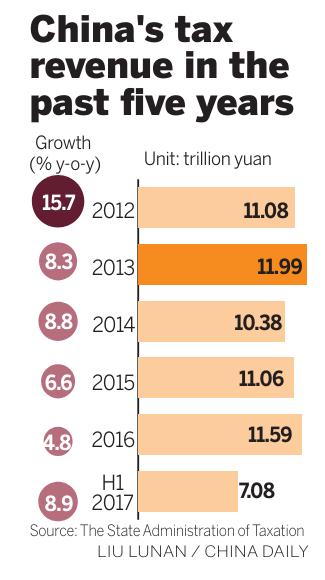Tax revenue from service sectors climbs rapidly in H1
China's tax revenue from the service sectors rose rapidly in the first half of the year, reflecting the country's improving economic structure, the top tax authority said on Thursday.
The nation collected 7.08 trillion yuan ($1.05 trillion) in taxes in the first half of the year, up 8.9 percent year-on-year, according to the State Administration of Taxation.
The service sector accounted for 57.6 percent of total tax revenue, up 1.1 percentage points from the level of last year, which showed the continuous improvement of the country's economic structure, said Zheng Xiaoying, a senior official of the SAT.
Retail tax grew by 25 percent year-on-year in the first half, reflecting that fact that consumption is playing a bigger role in driving economic growth, Zheng said.
Tax revenue from sectors such as sports, education, art and entertainment also surged strongly, indicating consumption in China is upgrading in more of the lifestyle services.

Zheng added that growth of the industrial sector's tax revenue in the first half reversed the declining trend last year, as the country's economic prospects continued to improve. China's GDP rose 6.9 percent year-on-year in the second quarter, beating market consensus for 6.8 percent.
To bolster growth, China has introduced a string of measures to deepen tax reform and to reduce the corporate tax and administrative fees burden. The country expanded the implementation of value-added tax reform to all industries last May, which helped cut tax by about 700 billion yuan.
Other measures included lowering tax rates for a number of industries, expanding corporate income tax benefits to more small firms, and increasing the tax deductible levels for research and development.
The latest official data showed that the total value of tax cuts for small and innovative companies amounted to 216.9 billion yuan in the first half of the year, up by 29.6 percent year-on-year.
The Ministry of Finance said earlier that the government would further expand its policies to cut tax and reduce administrative fees for companies, although it could mean slower growth of the government's fiscal revenue.
Gao Peiyong, director of the Institute of Economics at the Chinese Academy of Social Sciences, said that in addition to the existing reform in the areas of value-added tax and resource tax, more positive measures should be introduced for direct taxes-such as personal income tax and property tax.






















